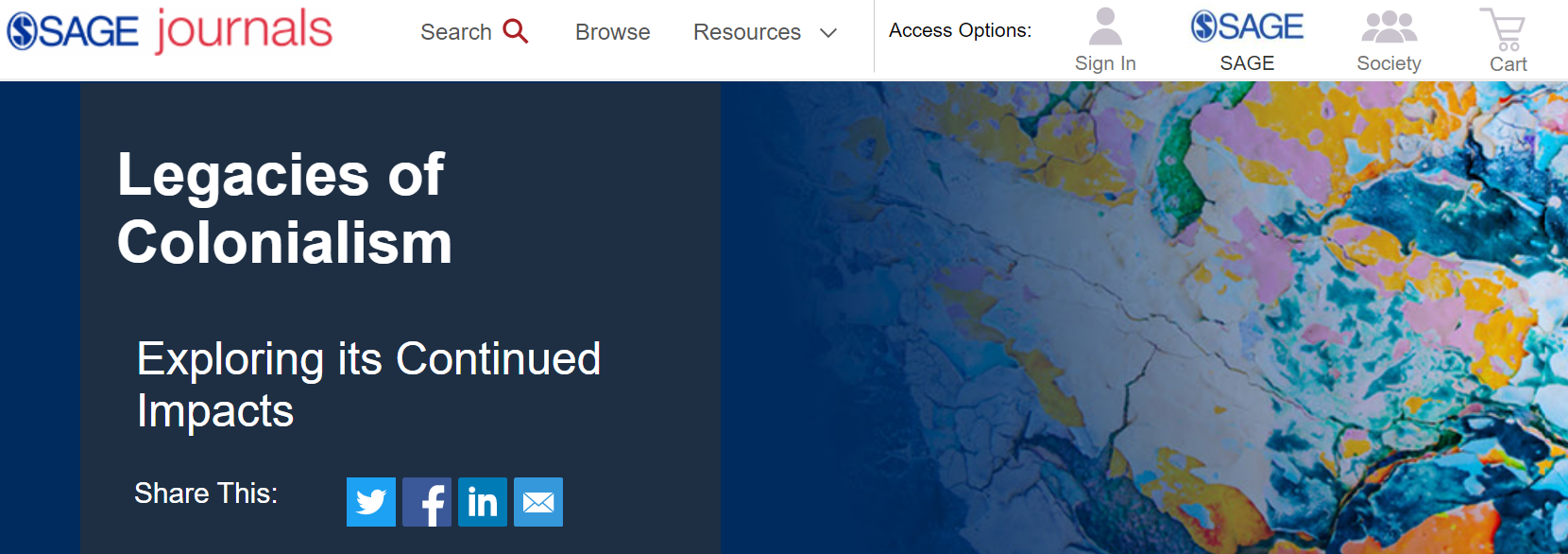Journals spotlight: legacies of colonialism microsite
By Martha Avtandilian, Publisher, Social Science Journals
SAGE is pleased to present a new multimedia collection of research exploring colonialism and its ongoing effects on global societies and identities. The “Legacies of Colonialism” microsite highlights key scholarship on reparative decolonization, anticolonial thinking, and the sociological, educational, spiritual, political, environmental, and economic effects of colonialism across oppressed peoples and environments.
The microsite curates research that examines the long-haul effects of colonialism, both effectually, across global societies, and as theory. The articles selected contextualize the ongoing impacts of our modern world’s iterative, fraught history with imperialism and colonialism, and what it may take to begin the long and steady process of undoing their stratiform tangle.
Colonialism is often defined as the exertion of power, and control—often political—by one country over another. Traditionally, this is understood as physical force such as occupation, labor exploitation, and environmental corruption. However, contemporary critical scholarship deepens our understanding of the more social and spiritual sides of colonialism, not just as consequences or effects, but in the reinterpretation of what it means to colonize. Many of the articles in this collection investigate the different shapes of colonization and the ways in which they persist—past the ephemeral, one-time historical events that they are sometimes erroneously represented as, and into expressed, persisting sociological concepts like coloniality. Articles like “Wonder as Feminist Pedagogy” and “Coloniality at work,” for instance, explore coloniality in feminist study and spaces.
The research collected extends beyond—or perhaps, ahead of—the study of colonialism and into the very design of “research” itself and its own colonial history. Articles like “Consenting to the Consent Form” and “Decolonizing both researcher and research and its effectiveness in Indigenous research,” which pose questions like, “How does one decolonize and reclaim the meanings of research and researcher, particularly in the context of Western research?,” explore researcher responsibility, ethical conduct, and Indigenous sovereignty when conducting research among Indigenous communities.
Other articles consider cultural productions of colonialism—a 2017 special issue of Cultural Studies ↔ Critical Methodologies, entitled “Settler Colonialism and Cultural Studies: Ongoing Settlement, Cultural Production, and Resistance,” edited by Drs. Aimee Carrillo Rowe and Eve Tuck, features nine articles that analyze settler (and other types of) colonialism scholarship across various social science disciplines.
Like this special issue, many of the pieces featured in “Legacies of Colonialism” define (and sometimes redefine) colonialism in all its forms as a means to more effectively agitate and deterge the structures, systems, and habits that have sprouted from its expressions. It is as much about addressing beginnings, with articles like “What can the sociology of race learn from the histories of anti-colonialism?” as it is in understanding futures (“Data Epistemologies, The Coloniality of Power, and Resistance”).
The Legacies of Colonialism microsite is a labor of a SAGE Journals workgroup dedicated to promoting principles of anti-oppression, inclusivity, belonging, diversity, and equity. Read more about our internal structure, our pledge commitments, and visit our “Structural Racism and Police Violence” microsite. If you have trouble accessing the research featured in our collections, please refer to this guide.

